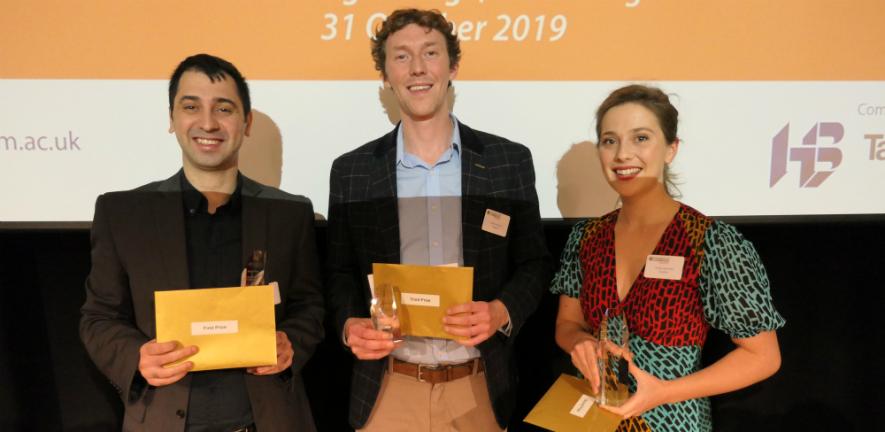
Submitted by Jane Durkin on Tue, 05/11/2019 - 10:29
Congratulations to Cambridge Language Sciences network members, Simon Baker and Gamal Crichton on winning first prize in the 2019 Cambridge Enterprise Postdoc Business Plan Competition for their early-stage startup, Versed AI.
Versed AI, which uses state-of-the-art Natural Language Processing (NLP) to automatically map supply chains, has won £20,000. As first-place winners, they will also have the opportunity to pitch at the next Cambridge Enterprise Venture Partners dinner, an investor forum of venture capitalists and business angels with more than £4 billion of funds under management by members.
The founders of Versed AI are Simon Baker, a Research Associate at the University of Cambridge’s Language Technology Lab, Gamal Crichton a PhD student also at the Language Technology Lab, and Pascal Wichmann, a PhD student at the Department of Engineering. The Natural Language Processing (NLP) and Machine Learning (ML) technology they have developed can text-mine millions of news articles, business reports and social media for relationships between organisations, companies, products, and people. This information can be used to create vast knowledge networks in order to discover patterns and infer missing or unknown knowledge. These networks have many useful applications and the team are currently focused on using them to automatically extract supply chain maps.
The Postdoc Business Competition, run by Cambridge Enterprise and Entrepreneurial Postdocs of Cambridge (EPoC), gives researchers the opportunity to develop their business ideas and improve their pitching skills. After the first selection round, each semi-finalist is matched with an experienced business professional as a mentor to help them improve their business plans. All six finalists this year were also awarded a year’s membership at ideaSpace, including tailored support and office space.
Simon Baker, project lead for Versed AI, said:
"The market research we had to do for the competition helped us accelerate our start-up tremendously. We were also put in contact with the most amazing mentor: a very experienced industry veteran who helped with business strategy, long term funding advice, and even client relations. The connections we made with Cambridge Enterprise will take us beyond what we have achieved in the competition alone. I also took part in very useful workshops to help me pitch in public. At the start, I was absolutely terrified of public speaking, but Cambridge Enterprise has helped me a lot to build up the confidence to win the competition.”
Finalists pitched their business ideas to a panel of expert judges at the Grand Finale event on 31 October 2019. Pitches were judged on a number of criteria, including each business’s competitive position, the potential for new business creation and the teams’ collective skill set.
The second prize of £10,000 went to Univursa, which is building a lightweight application to help public health officials detect and respond to disease outbreaks. The third prize of £5,000, was awarded to Cambridge Bioelectronics, which is pioneering a novel Spinal Cord Stimulator (SCS) implant, with high-resolution stimulation for superior chronic pain management.
Other finalists included: PoliValve, which is developing the next generation of heart valve prostheses; Pinpoint Oncology, which has developed a novel genetic test that benefits cancer patients by pinpointing the best drug for treating their tumour; and Inkling, which is developing graphene-enhanced windblade coatings that are resistant to rain erosion, thereby prolonging the operating life of wind turbine blades.
Photo credit: image courtesy of Cambridge Enterprise
